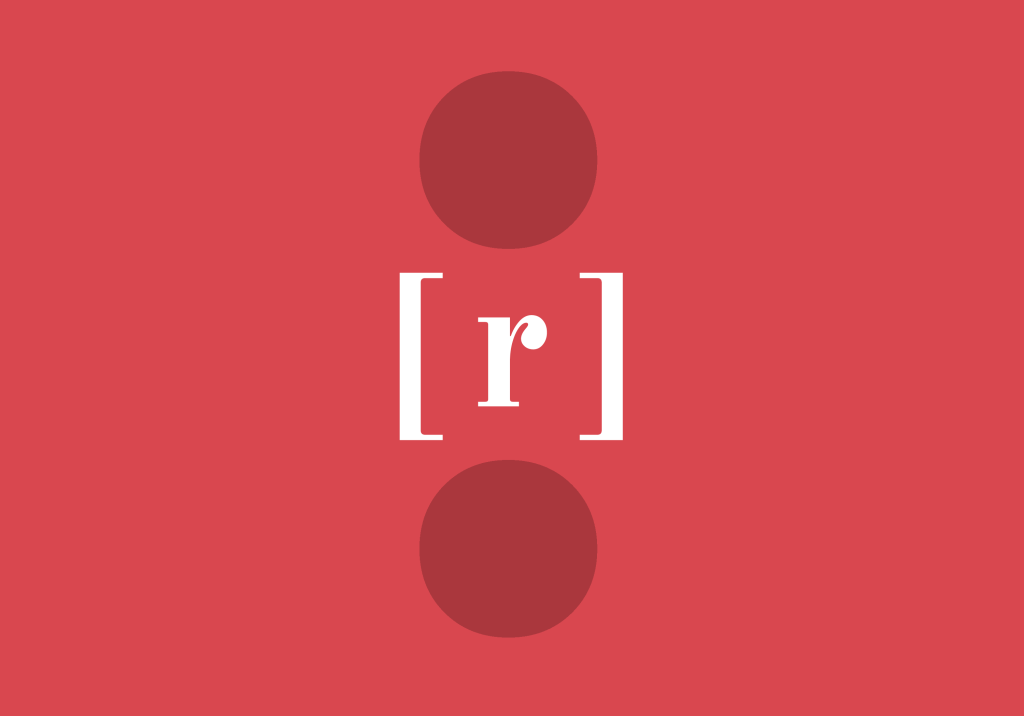Driving southbound on the derelict eastern shore of the Salton Sea, you arrive in Niland, California and keep driving on Main Street until it is no longer itself and past the famed candy colored now-cinematic Salvation Mountain you enter Slab City “The Last Free Place” where sign after handmade sign sirensong you to come “visit the library”, as if pleading.
On a daytrip with my wife, son and a couple of friends, rather than just jump out and take photos and race away, I wanted to insist on some kind of exploring of the off-the-grid community, comprised of snowbirds, counterculture types, ne’er do wells and what-have-yous. We left the blacktop and proceeded down a dirt road where more signs caution to slow down and not kick up dust—leaving the front end of Slab City rife with fancy rvs, motor homes and satellite dishes, the structures are decidedly more D.I.Y.—one favorite I recall was a fenced-in backyard made out of palm fronds.

Jonathan Basile’s Tar for Mortar: “The Library of Babel,”libraryofbabel.info, and the Dream of Totality is a short text, but it contains great reaches inside. Basile takes strong cues from Derrida’s notion of ‘iterability’, which Derrida took to signify not just repetition as in ‘reiteration’ but as in every iteration is an alteration, or a modification of the same. For all the term’s slippage, Basile doesn’t use the word sloppily, and in fact its unpacking greatly illuminates his overall thoughts and project while working on Borges. The creator of libraryofbabel.info, Basile plays both its interpreter and apologist, explaining the limits of Borges’ brilliant thought experiment-cum-fiction and doesn’t shy away from not only approaching the daunting mathematics involved—another great read in this vein is The Unimaginable Mathematics of Borges’ Library of Babel by William Goldbloom Bloch—but more than others actually notices Borges’ grim sense of irony and works to explicate it.

While I was reading Basile I immediately thought of my trip to the Slab City Library—we pulled up out front (unfortunately but inevitably stirring up dust) and once inside the folks working the counter immediately stopped conversing (never a good sign). I smiled and said hello, doing my best to be unassuming and not pretentious and began to browse. The small house that is the library contains some few thousand books, possibly less, and they are in no order whatsoever. More than that, they were all weather-beaten, exposed to the elements (there was no back wall to the structure), sun-rotted and caked in dust.
No one will know, or ever know, just what books are in the Slab City Library.
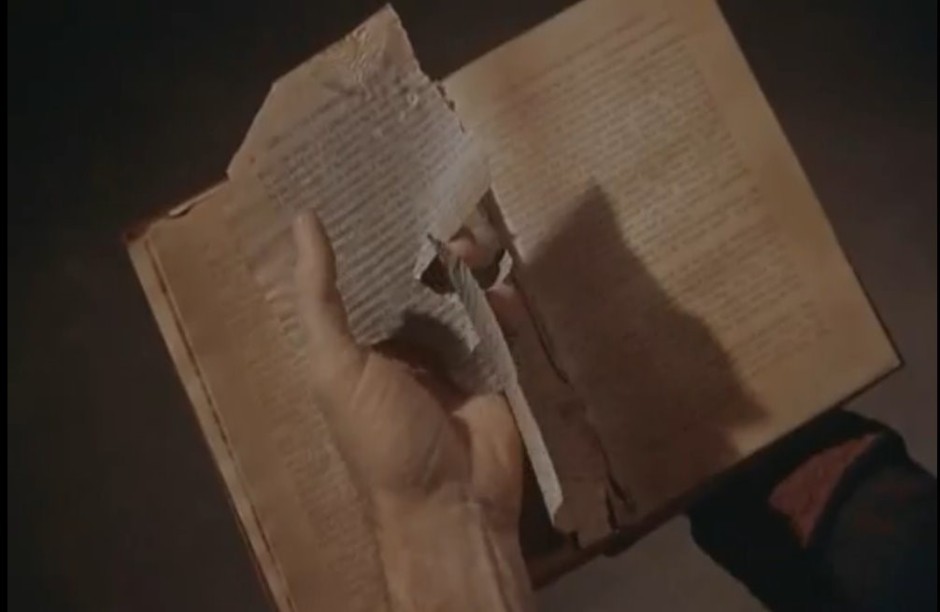
I find Basile at his most endearing here: So I’ll conclude with a consideration of a trend in the recent criticism of Borges that I find in its most extreme forms highly suspect: the effort to cast him as a prophet of the internet and related digital technologies. Tough these critics may intend to pay homage to a visionary author, there is just as much in their work that suggests to me an ideology of technological progress, unable to mount a genuine engagement with Borges’ text or to achieve a critical distance from its own culture.
Yes! While I of course ‘love’ Borges, I cannot stand hagiography, and the semi-worship made ready for the foreboding, blind prophet poet Borges does little to actually engage new readers in the way Borges probably wished to be read. I hate to sound Straussian, not that there is a ‘secret’ Borges (what would that even mean?), but at times the credulity of some when encountering the master (“The Master”) Borges could style himself has frustrated me—rather its his cheekiness, his boldness and yes slyness that wins one over and places Borges firmly in that artful realm of seeming untouchability. Basile poses his attack, if it is as strong as that, in a twofold manner: (1) a straight forward analysis and explanation of the real limits and contours of the Library of Babel, i.e. no mystification, no ellipses, no flashbang rhetorical smokebombs to duck and cover behind… and (2), a pivot on the ‘dreamness’ of it all, of its textual morphology in a certain Mobius strip type of way—to ‘get’ the point is to miss the point entirely!
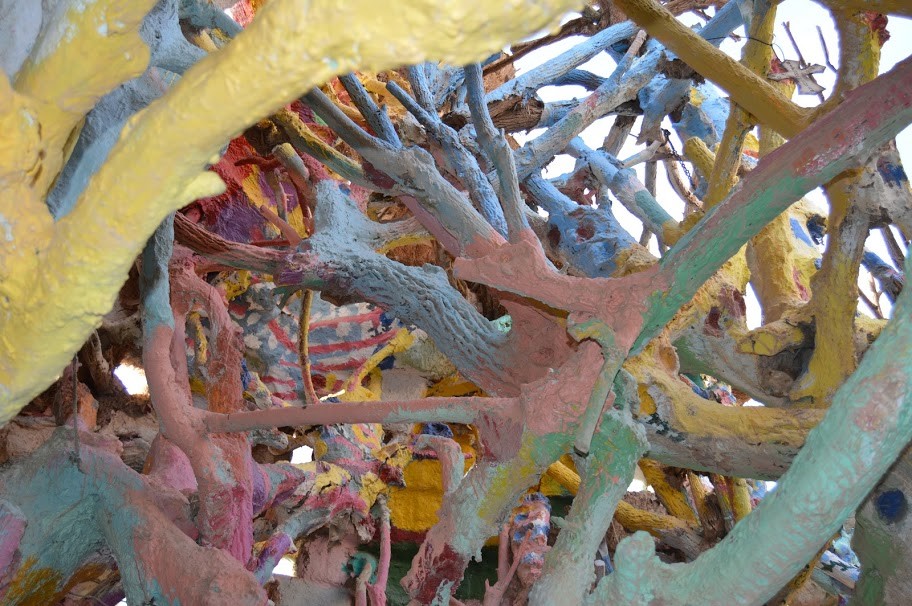
But to return to ‘iterability’—the citationality of it all, “This universe in which all of nature becomes a vast library can be read as an allegory and foreshadowing of the deconstructive idea that there is no outside the text. Not in the naïve sense, of course, that we are dealing with a text only when we see something resembling a book, but rather in the broadened significance of generalized textuality—when we see how Borges expands the properties of iterability and dissemination to encompass all forms of existence. Within his library, taking some books from the shelves, we can find examples of the porousness of these pages, of the intertextuality showing us that both within and beyond the text is—other text.” Basile recognizes Borges’ desire to affirm the infinity of the Library but at the same time the tragic gesture of not being able to follow through, to represent, to think or to feel such a thing. At the heart of this, language’s attempts and failures at exhaustion, is iterability. This iterability allows Basile to demonstrate that despite the numerous punctuations of expression possible in the Library’s galleries, the atomism(s) involved in exploring just how pure difference can arise without referral to a prior essence of some sort are very prone to contradiction. Comparisons are made to Nietzsche’s “Eternal Return”—and while all this philosophy speak shouldn’t deter you, let it be said Basile never hits the reader over the head and is a faithful guide throughout the book.
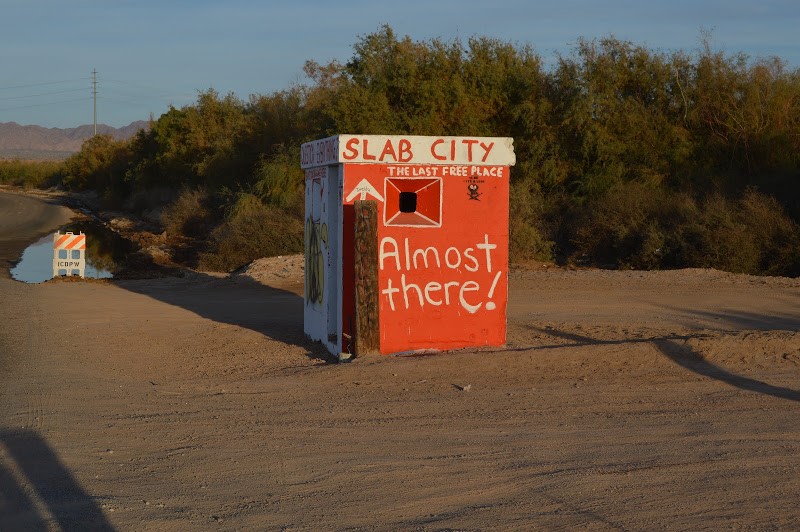
We drove away as shadows lengthened across the desert floor. Inside the library a mother and two small toddlers, dressed only in diapers, were covered in dirt and playing about with some children’s books. There’s very much a recognition that at Slab City, this is truly the ‘end of line’ for some people—if neurotic privileged petit bourgeois people like me can ever truly summon what the end of line for themselves or others could be. And yet, at that terminal, there is freedom, and Basile concludes (almost unfortunately, we wish for him to continue) there is an arrival in this ‘finitude’ with the virtuality of exhaustion into genuine play, and thankfully, play always defies the totality.
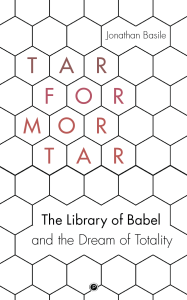
Jonathan Basile is the creator of an online universal library, libraryofbabel.info. His non-fiction has been published in The Paris Review Daily, Guernica, and Electric Literature, and his fiction has been published in minor literature[s] and Litro. He is currently a Ph.D. student in Emory’s Comparative Literature department. @JonotrainEB.
Trevor Jones is a librarian and writer in San Diego, CA.
Tar for Mortar: “The Library of Babel” and the Dream of Totality is published by Punctum Books.
Photos used with Trevor Jones’s permission.

